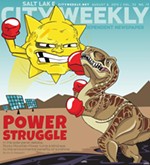The Joys of Summer
The old calendar on the wall says it’s the first weekend in May. And according to the chrono-logic of Hollywood, that means … IT’S SUMMER, BABY!
Those of us who just last week put away the snow boots and unwrapped the swamp cooler may have a hard time grappling with the idea that we should be ready to slather on the sunscreen. Yet for around a decade now, the studios have looked to the beginning of May as the moment to begin four months of youth-skewing megahype. They used to have the good taste to wait at least until Memorial Day weekend, but the success of Twister in 1996’s early-May slot initiated a sort of entertainment industry “mission creep.” As with Major League Baseball, it’s beginning to feel like there’s no off-season.
These are supposed to be the months that try critics’ souls, when the Great Divide between the cinema elite and the unwashed multiplex masses most clearly manifests itself. We snort derisively at The Day After Tomorrow--cha-ching, $187 million in grosses pour in. We shudder at Van Helsing--bang, another $120 million. We laugh hysterically at King Arthur--well, even a stopped clock is right twice a day.
Conventional wisdom has it that the summer blockbuster represents everything corrupt and misguided about the state of contemporary filmmaking, and recent history has given anyone over the age of 15 plenty of reasons to dread the latest CGI-fueled monstrosity lined up to suckle at American moviegoers’ indiscriminate teat. But what if we’re cutting off our snooty critical noses to spite our faces? What if the conventional wisdom is all wrong--and the kids are all right?
In his recent book "Blockbuster: How Hollywood Learned to Stop Worrying and Love the Summer," British film writer Tom Shone makes a contrarian argument in defense of big-budget “event movies.” Where Peter Biskind’s "Easy Riders, Raging Bulls" bemoaned the Spielbergization of American moviemaking as the death knell for the early ’70s auteurism of Altman, Coppola, Scorsese and the like, Shone takes the populist side. He doesn’t pretend that the trend towards bigger-faster-more hasn’t produced a lot of crap--especially once the global market expansion in the 1980s made it more fiscally prudent to avoid stuff like plotting and dialogue that required translation--but he’s justifiably suspicious of Chicken Little-ing the phenomenon as a whole. He notes that 1970s hits like Jaws and Star Wars saved a studio movie business on the verge of financial collapse, and that those films marked a return to a Golden Age “give the people what they want” ethos that would have made Louis B. Mayer proud.
Shone is on to something--but really only a part of it. Though blockbusters are good business in the short term, they’re also good for movies in the long term. Whether we like to admit it or not, the next generation of cinephiles is not likely to be born from watching Godard and Eisenstein. That part comes later. First, you have to inspire a joy at the experience of going to the movies. Like many in my generation, I fell in love with movies at matinees of Star Wars and Superman, and it seems ridiculous to assume that those who follow aren’t going to find their bliss in essentially the same place.
Studios, for their part, seem to be demonstrating at least a basic understanding of the power these seminal summer movie experiences are going to hold. They’re placing their most precious properties in the hands not of hired hacks, but artists with a distinctive vision. Spider-Man went to Sam Raimi; The Lord of the Rings went to Peter Jackson; X-Men went to Bryan Singer, who will move on to next year’s Superman Returns. Alfonso Cuarón took a stab at the Harry Potter franchise, and Ang Lee tackled Hulk. This summer’s Batman Returns would gross a mint no matter whom Warner Bros. hired to oversee it; the fact that Memento director Christopher Nolan got the job says something about an industry with an eye towards giving its target viewers a reason to keep coming back for more.
Will summer generally be a place for the Roland Emmerichs and Michael Bays of the movie world to play with their toys? Probably. But one great adventure for a kid in a darkened theater can make a dozen pieces of disposable eye candy disappear from the memory in a hurry. I envy that kid his first kiss of movie-love--the kind of romance that sometimes just has to happen in the summer.






